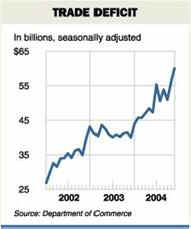 |
| Central banks shift reserves away from US |
| Moves seen undermining the dollar |
| By Chris Giles Jan. 24, 2005 |
| Central banks are shifting reserves away from the US and towards the eurozone in
a move that looks set to deepen the Bush administration's difficulties in financing
its ballooning current account deficit. In actions likely to undermine the dollar's value on currency markets, 70 per cent of central bank reserve managers said they had increased their exposure to the euro over the past two years. The majority thought eurozone money and debt markets were as attractive a destination for investment as the US.  The findings emerge from a survey of central bank reserve managers published today and conducted between September and December of last year. About 65 central banks, controlling assets worth $1,700bn, took part and the results showed a marked change in attitude over the past two years. Any rebalancing of central bank reserve portfolios has serious implications for the global financial system as the US has become increasingly dependent on official flows of funds to finance its current account deficit, estimated at $650bn in 2004. At the end of 2003, central banks held 70 per cent of their official reserves in dollar- denominated assets and central bank purchases of US securities had financed more than 80 per cent of the the US current account deficit in 2003. Any reluctance to increase exposure to dollar assets further could cause the greenback to plunge on currency markets. "The US cannot take support for the dollar for granted," said Nick Carver, one of the authors of the study conducted by Central Banking Publications, a company that specialises in reporting on central banks. "Central banks' enthusiasm for the dollar seem to be cooling off." In a further worrying sign for the greenback, 47 per cent of reserve managers surveyed said they expected the growth of official reserves to slow to less than 20 per cent over the next four years. Between the end of 2000 and mid-2004, official reserves had increased by 66 per cent. Slower reserve accumulation growth implies the supply of official finance is likely to become more limited but few expect the demand from the US for finance to slow. The consensus among economists is that the US current account deficit will increase to $694bn in 2005. More than 90 per cent of central bank reserve managers said that the income from reserve management was "important" or "very important". In the two years since a similar survey was conducted, reserve managers had begun to seek higher returns for the money under management. For these managers, dollar assets have become less attractive because the fall in the dollar since 2002 has reduced the yield they received and, in some cases, has led to negative real returns. Alan Greenspan, the chairman of the Federal Reserve, warned in November that there was a limit to the willingness of foreign governments to finance the US current account deficit. The survey was conducted on the guarantee of anonymity for the banks involved. The 65 central banks that participated control 45 per cent of global official reserves. Individually, they had up to $250bn under management. |